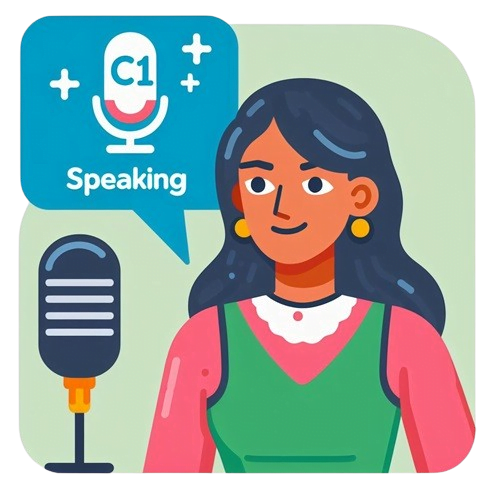Cambridge C1 (CAE): Guide to Speaking Part 4

Key Takeaways:
- Predict the kind of questions you might be asked in Part 4, while you are still doing part 3.
- Remember that you are not being assessed on your ideas.
- Once you are asked a question, immediately think of one main idea (think of one word that explains your main idea), one explanation for the main idea, and one example of it.
What you will find in this guide:
CAE Speaking Part 4
The Speaking test of Cambridge C1 (CAE) contains four parts. There are always two examiners, one is called the interlocutor, and the other is called the examiner. You will only speak with the interlocutor and the examiner will only observe you. The interlocutor manages the interaction either by asking questions or providing cues for the candidates. The examiner does not join the conversation.
In CAE Speaking Part 4, the interlocutor directs the interaction by asking questions which encourage the candidates to discuss further and broaden the topics introduced in Part 3. The questions often focus on more abstract issues as the discussion develops. This part of the test gives candidates an opportunity to show their ability to exchange information, express and justify their opinions, and agree or disagree with one another. It also provides candidates with an opportunity to show that they are capable of discussing topics and certain issues in more depth than in the earlier parts of the test.
Part 4 Sample Question
If you want to prepare for CAE speaking part 4, one of the best ways is to watch actual examination interviews. The video below is taken from Cambridge’s official channel and showcases a real speaking exam.
Examiner's Comments
Want to know what Cambridge Examiners thought about the performance of the candidates in the video you just watched? You can read their comments down below! These comments offer a unique perspective on how well the candidates managed to communicate their ideas and interact with their partner. This is an invaluable part of the learning process, helping you to refine your skills for future examinations.
The Rubric
The rubric is your roadmap to success in Part 4 of the Speaking test. It outlines the criteria you’re being assessed on, such as the range of language used, coherence, pronunciation, and interactive communication. Understanding the rubric means you know exactly what the examiners are looking for, allowing you to tailor your responses and engage in the discussion more effectively.
Potential Challenges
Part 4 of Cambridge C1 CAE speaking may be difficult for some candidates. In this part of the guide, I’ll explain those challenges, and I’ll give practical guides and steps to overcome those challenges in the next part.
- The abstract nature of the questions: The questions in this part are a bit more abstract than in the other parts. This abstraction could may it difficult for you to find ideas to talk about.
- Supporting ideas: Finding relevant information or vocabulary to back up your points can be quite a task and the abstract nature of the questions doesn’t make it any easier. Some candidates get stressed out and forget their ideas because of that. Some others just don’t have any ideas how to support their opinion.
- Maintaining fluency and accuracy: With the abstract questions, keeping my speech fluid and correct can be quite daunting. You have to keep your ideas flowing smoothly while ensuring that every word is used correctly and appropriately. This is especially difficult when you haven’t thought about a topic/question before.
Guide to Part 4
Part 4, the discussion, tests your ability to use English to talk about abstract matters. It also examines your ability to express your opinions and support them in an exchange. Remember that there is no right or wrong answer to this task, just speak up and express your opinion. So, please do the following:
- It’s a good idea for you to predict the kind of questions you might be asked in Part 4, while you are still doing part 3. This will help you prepare for what you might be asked to talk about in Part 4.
- Remember that you are not being assessed on your ideas. It doesn’t matter what you say, it’s how you say it and how you support it that’s important.
- Once you are asked a question, immediately think of one main idea (think of one word that explains your main idea), one explanation for the main idea, and one example of it. For example: If you are asked about whether or not it is a good idea to have fun, immediately decide Yes/No, think of a reason for it, and an example. Your thinking shouldn’t take more than 2 seconds. Then start talking!
- Make sure to use conversation fillers to give yourself time to think, e.g. ‘Well’, ‘now’, ‘let me see’. However, do not over-use these as this will limit your range of language.
- Use appropriate linkers and cohesive devices to connect your ideas.
- Speak naturally at normal pace. Do not speak fast and make sure you are not speaking slowly. Sometimes, candidate get stressed out and speak faster or slower than they usually do as a result of their stress. Make sure this wouldn’t happen to you.
- Do not use memorized phrases. Rehearsed speeches should be avoided as these are easily spotted and they might be inappropriate for the questions asked.
- Try and use a variety of appropriate tenses, structures and vocabulary in this part of the test.
Speaking Part 4 Practice Questions
Use the guide to practice and speak about the following topics.
Topic 1
- In what ways can training change people’s attitudes in the workplace?
- Some people think that school does not train young people adequately for the world of work today. Do you agree?
- Which is more important to teach people: a sense of team spirit or individual initiative? Why?
- How difficult is it for young people to find jobs nowadays in your country? Why?
- What can be done to create jobs for young people?
Topic 2
- In what other ways can a company keep its customers happy?
- The best form of publicity for a product was once thought to be “word of mouth”. How true is this nowadays?
- Advertising campaigns persuade us to buy unnecessary things. To what extent do you agree?
- What future is there for small companies in today’s world?
- How important is it for companies to be aware of environmental issues?
Topic 3
- Are we slaves to consumerism?
- How do we avoid credit card debt?
- How important is it to save money?
- Some people earn much more money than others. Is this fair? Why (not)?
- Some people say money can’t buy happiness. To what extent do you agree with this?
Topic 4
- How good an idea would it be to build a new tourism development in your area
- Where do you think the best place to build it would be?
- What environmental considerations should one think about when building holiday developments like this?
- Do people overestimate the importance of holidays?
- Are there any places where you think it is inappropriate to build theme parks and specially designed holiday resorts?
- What are the advantages of going abroad on holiday?
Topic 5
- Are all these new gadgets really necessary?
- Are you fascinated by new gadgets like the latest iPhone?
- Are technological advances always for the best?
- Can you imagine your life without a mobile phone?
- How can we use technology in education?
Topic 6
- Do you think working in a sales department would be interesting?
- Why is social media so important for businesses?
- Do you think advertising can be unethical?
- Do you think sponsorship has made sport into a business?
- Do you think companies should pay so much money to top sports stars?
Speaking Checklist
Use a checklist to track your performance. Download the checklist here and evaluate your speaking.
How was your experience?
Describe your experience taking the part 4 speaking in the comment section below.






For me, this part is confusing since I am really bad with grammar anyways with practice it is possible
From my point of view it’s something difficult because we need to have knowledge about those topics to develop in a fluency way
It’s something difficult because we need to organize our ideas, but also are daily and normal topics, so we can develop some interesting facts about that
In my outlook, this part push you to think in a deep way in daily things.So, for me it is very difficult
For me it is a bit complicated to quickly think of a question that I have never thought about before and on the other hand think of related vocabulary